How to Stop Stress Eating
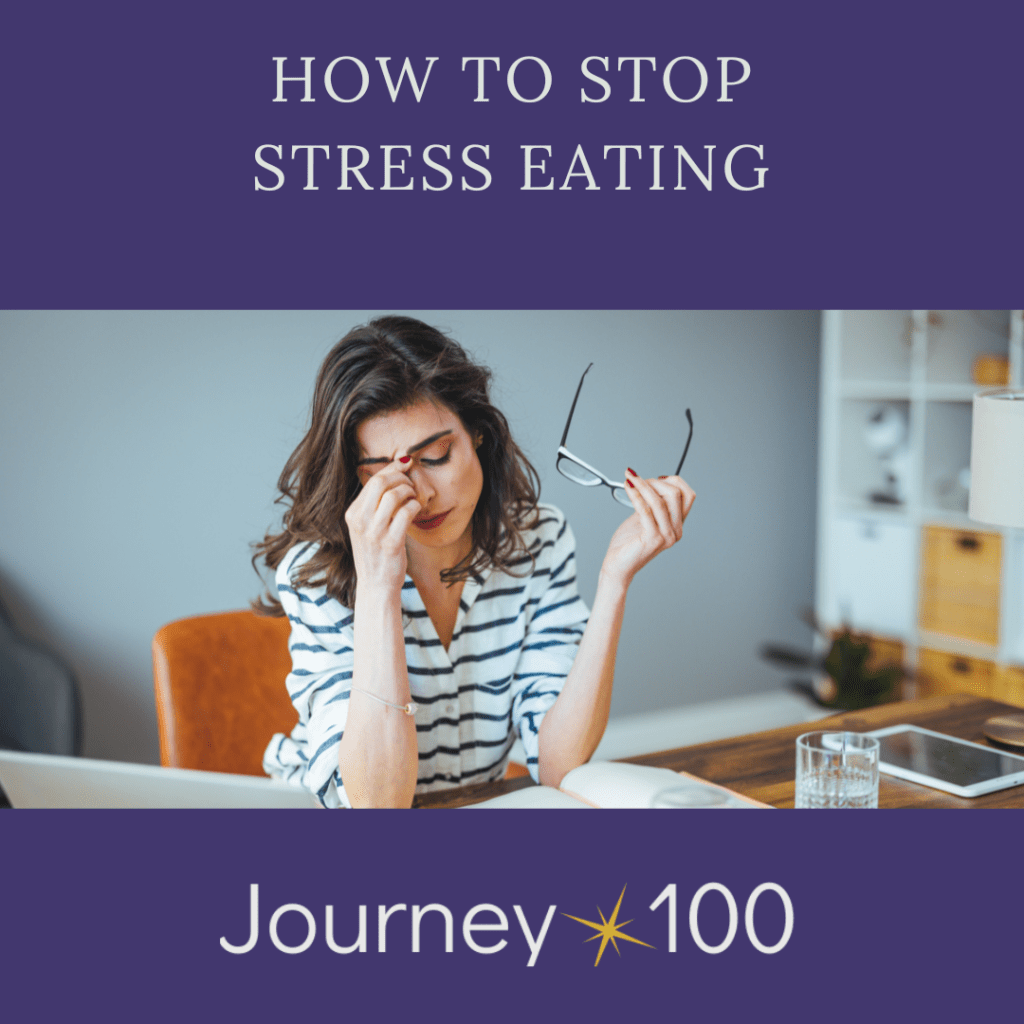
Feeling Stressed? You’re Not Alone When life feels overwhelming, it’s easy to turn to food for comfort. Stress, anxiety, exhaustion—it can all lead to mindless snacking or emotional eating. If you find yourself reaching for food when you’re not truly hungry, you are not alone. And more importantly, you deserve other ways to care for yourself that actually help you feel better. Food might feel like the easiest way to soothe stress, but it’s temporary. Real comfort comes from addressing what you truly need. Here are three simple ways to stop stress eating: 1. Start with Gratitude When stress hits, it’s easy to focus on what’s wrong. A simple shift toward gratitude can help break the cycle of emotional eating. Try this quick practice: Take a deep breath. Name three things you’re grateful for—big or small. Let that gratitude fill your mind and body for a moment. Gratitude helps ground you in the present, making it easier to respond to stress in a way that actually feels good. 2. Take a 10-Minute Break from the Urge to Snack Cravings often come in waves and pass if you give them time. Instead of immediately reaching for food, take a short break and do something else for 10 minutes: Step outside for fresh air. Listen to a song that lifts your mood. Do a short breathing exercise. Often, by the time the 10 minutes are up, the urge to snack has passed, and you’ll feel more in control of your choices. 3. Move Your Body to Release Stress When emotions build up, movement is a powerful way to release them—without food. Try: Stretching for a few minutes. Shaking out your arms and legs to let go of tension. Dancing to your favorite song. Movement doesn’t have to be a workout. It’s just about reminding yourself that your body is strong and capable, and that you can handle stress in a way that supports you. You Deserve True Comfort Eating to soothe stress is understandable, but it doesn’t solve the problem. In fact, when you choose to stress eat, it temporarily distracts you from the stress but adds more later as you feel overly full or gain weight. You deserve real comfort—comfort that lasts beyond the moment. By trying these small, simple shifts, you can begin to create new ways to care for yourself without relying on food to relieve your stress. The next time stress hits, pause. Breathe. Choose something that truly helps you feel better. You are stronger than you think. Need More Support? If you’re looking for more ways to manage stress, take care of yourself, and lose weight in a way that feels good, I’m here to help. Let’s do this together. Click here to schedule a call with me. Your Coach, Andrea
Four tips to Stop Nighttime Snacking
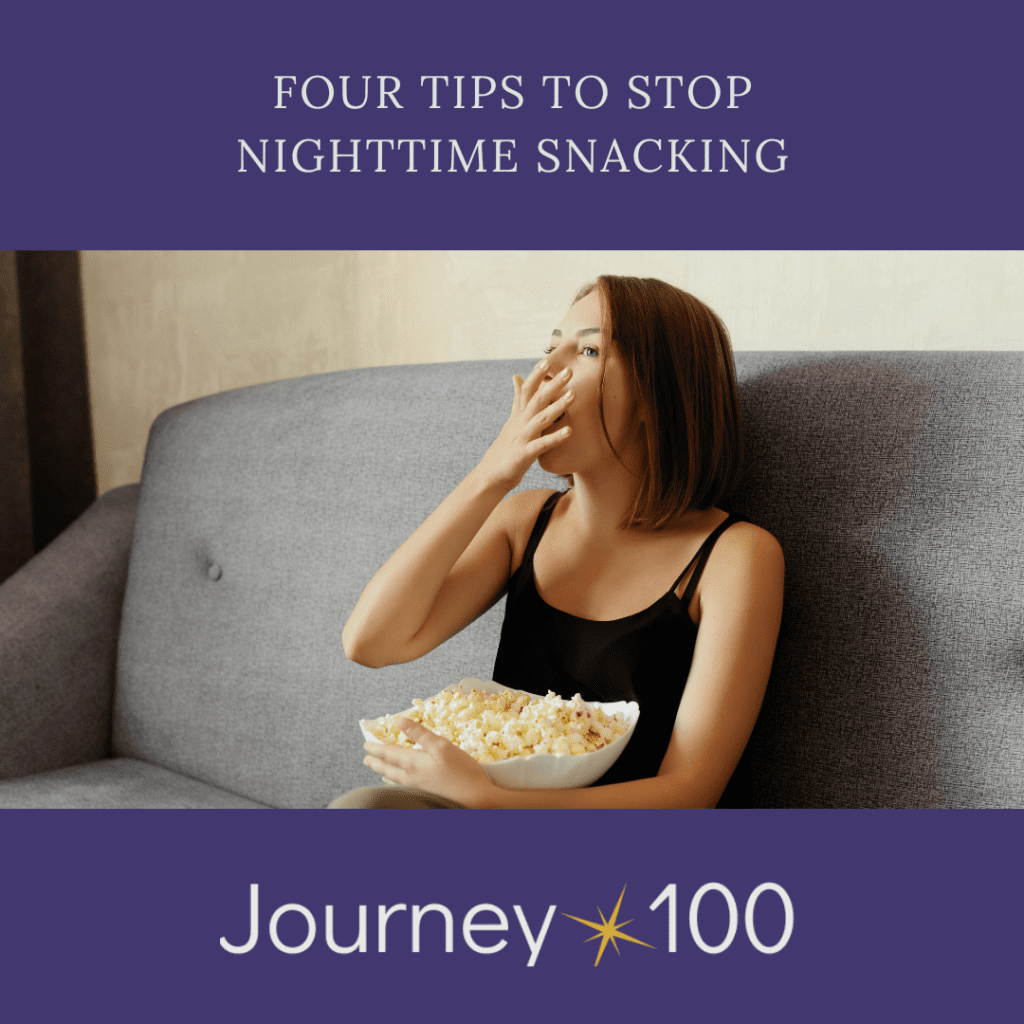
So many women I work with are stay on plan breakfast and lunch but go off the rails in the evening. They succumb to nighttime snacking to unwind from the day but it also undoes their weight loss. Here you will learn four tips to stop nighttime snacking and consistently lose weight: Reconnect With Your Why Instead of focusing on stopping nighttime snacking, it is helpful to focus on what you want: lose weight! Before you snack, stop and think about why you want to lose weight. Do you want to be healthy for your kids? Feel better in your clothes? Have more energy? Remind yourself of your why. Picture how proud you’ll feel in the morning when you stick to your plan. Create a New Evening Habit A lot of nighttime snacking is just a habit. This is great news because habits can be formed and destroyed. It’s as easy as doing something else instead! It can be as easy as choosing to watch TV in a different chair to change your habit. You can also sip a cup of tea, take a warm bath, or write down three things you’re grateful for. Find something that feels good and helps you relax without food and before you know it, you’ll be getting closer to your weight loss goal. Out of sight, Out of mind Don’t leave snacks where you can easily see them. At the end of the day, you are often emotionally and physically drained. Seeing crave-worthy foods is a recipe for caving-in. Often times, you don’t have the mental bandwidth to tell yourself no. Put snacks in hard-to-see places or don’t buy them at all. Instead, keep healthy options around like veggies, fruit, or yogurt if you really need something to eat. Set a Kitchen Curfew The final tip is to pick a time when the kitchen “closes” for the night. Wipe the counters down and start the dishwasher. If you need to, put a chair in the doorway to keep you out. After that, brush your teeth or chew gum. It’s a simple way to remind yourself that eating is done for the day. Remember nighttime snacking is just a habit. Just something you’re used to doing. And it can be changed. You won’t cut nighttime snacking in one try. Try one or all of these tips to stop nighttime snacking and before you know it, it will be a thing of the past. Be patient with yourself and celebrate all your wins! And remind yourself that you are evolving into that future version of yourself that is living and loving her goal weight life! You’ve got this! Your Coach, Andrea
How to be a Cravings HERO
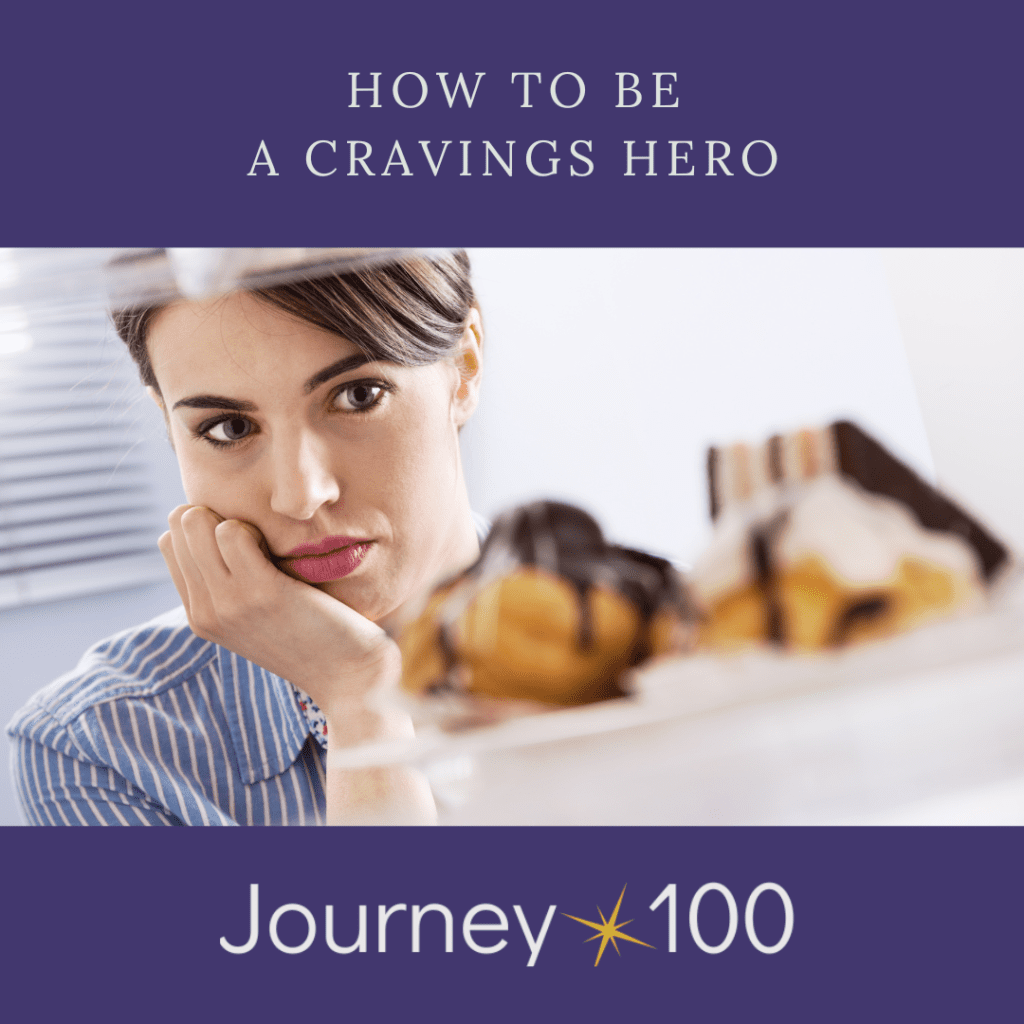
Cravings and urges for foods are a part of the human experience. But when you are trying to lose weight and urges for crave-worthy foods come up, this can cause problems for your weight loss. Below I’m going to teach you how to be a cravings hero instead of a weight loss zero. Acknowledge the craving When you have a craving, the first step to being a cravings hero is to acknowledge it. You can’t step up to be the hero until you know there is a problem. Acknowledging it isn’t hard. All you have to do is say to yourself “I’m having a craving for some chocolate” or “I’m having an urge to eat potato chips.” Acknowledging this thought it key to bringing your awareness to the situation. It helps you to start slowing down your thoughts and engaging your logical brain. There is nothing right or wrong about having a craving. It’s something that happens. Sometimes the simple act of acknowledging it and telling yourself this is normal is enough to take the pressure off. Change the scenery Yes, go somewhere else. You can make allowing a craving to pass much easier on yourself when you leave the area where you first felt that craving. Often our cravings happen in the kitchen. Take a three minute walk to the mailbox, go to your bedroom or any other part of the house. Changing the scenery gives you the time and space to consider how you want to react to that craving. It is difficult to think through your choice when the food item that triggered the craving is staring you in the face. Taking just a few minutes to go somewhere else gives you the opportunity to reset and think through how you want to respond. This is normal and temporary Often the biggest frustration about cravings is that we don’t think they should be happening. We want to pick a diet plan and stick to it perfectly without any bumps or hiccups. But that’s not real life. Bumps, hiccups and cravings are all a part of the game. You can take a lot of pressure and frustration off your weight loss journey by simply accepting that this a normal part of the process. After you remind yourself that cravings are normal, remind yourself that they are also temporary. They do not last forever. Cravings don’t just going away by giving into them. There have been many times where I have wanted some potato chips or chocolate and didn’t have any in the house. I was too lazy to go to the store and get them so I just went without it. And guess what? Eventually I stopped thinking about it and moved on. The craving went away. You’re in control Whether it feels like or not, you are always in control. If you decide to eat the food or not, you did so because you decided to. This is a beautiful thing. It’s not the delicious looking slice of cake that made you eat it. It wasn’t the bag of popcorn that moved your hand up to your mouth. You always get to decide and take action. There is no right decision either. You can decide to eat it, decide to plan for it another time or decide not to eat it at all. Those choices are available to you. Consider your weight loss goal and how each decision will affect it. As long as you like your reasons then go for it! On my weight loss journey, no foods were off limits but I made a food plan each day and if the craving food wasn’t on the plan, I didn’t eat it. I would choose to write my craving food on my plan for the next day as a way to keep my promise to myself that day but also acknowledge that if I wanted something and I could truly have it when it was planned for. Celebrate it Eating food is a pleasurable activity. When we say no to cravings because we “shouldn’t” it can feel like punishment or restriction, which is not pleasurable at all. If you decide to eat the food but followed the process above, that’s something to celebrate! If you decided to plan for the craving food for another time and delay gratification to be more intentional in your choice, another great celebration. If you decided not to eat the food now or later, wonderful! In any of these situations, you are becoming more aware and intentional in your choices and that is something to celebrate! Your coach, Andrea
Three steps to stop eating when not hungry
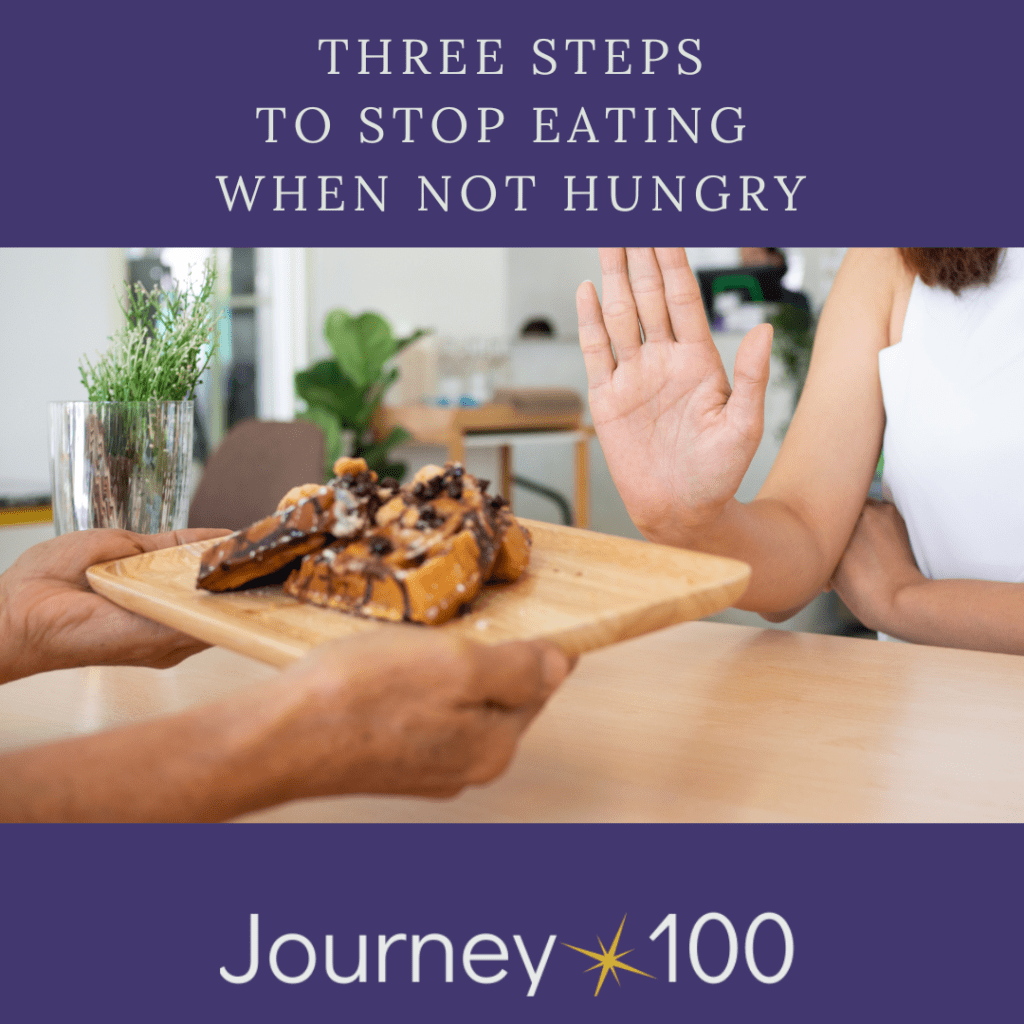
Eating when you are not hungry equals weight gain. And if you are on a weight loss journey that is a recipe for disaster! But how do you stop eating when you aren’t hungry? Follow these three steps to get back in tune with your body and stop eating when you aren’t hungry: Step One: Identify your hunger signs The first step to stop eating when you are not hungry is to figure out if you really are hungry. For many women this can actually be quite difficult. You’ve spent years eating by the clock, eating to relieve stress or eating because it simply feels good. To determine if you are physically hungry, drop into your body. What does that look like? Close your eyes. Ask yourself where do I feel hungry? For me, I know I am truly hungry when the middle of my abdomen feels a little tight. I also get slight growls in my stomach. If I have been truly hungry for a bit then the hunger starts appearing in the front of my head as a slight headache and I will feel my energy levels begin to dip. On the other hand, these physical sensations are not present when I am not hungry. Instead I will find myself “tasting” food in my mouth, like daydreaming about how good a Reese’s peanut butter cup would be right now. Sometimes when I am not hungry but WANT to eat, I will ask myself “Am I hungry?” and then soon enough I will feel a little tingle in my stomach. This is phantom hunger. It’s like a little ghost of hunger that comes pretty quickly after I get a craving for something. This isn’t true hunger. How do I know? Go to step two. Step Two: Take an inventory of your circumstance When I find myself wanting to eat when I’m not physically hungry, I take a moment to figure out what is going on in my life. One great way to do this is ask yourself “If I wasn’t going to eat right now, what would I be doing?” So often that 3pm hunger is actually being tired of work and not wanting to start another work task. In the evenings, I would be left alone with my thoughts about what I screwed up during the day, what’s left to be done tomorrow or thoughts of how I’m so exhausted and nothing really feels good in my life. Other times, I am just plain bored and want to be entertained! Once you figure out if you want to eat to avoid something in your life, then solve for that. If I am tired of work and don’t want to start another work task, then I take a 15-minute break and go for a walk, meditate or watch a couple silly tiktok videos (be sure to set a timer and don’t go beyond the 15 minutes!). If I’ve put the kids to bed and I don’t want to be left alone with my troubling thoughts, I break out my journal, jot down a quick to-do list for the next day, tell myself I’m a good wife and mother, then give myself permission to rest and relax. If I want to be entertained, then I snuggle in a blanket and watch my favorite show. Understanding what you truly need in that moment will help you understand and care for yourself better. When you start solving for what is actually bothering you, the less you will feel driven to eat at times when you are not hungry. If you’ve identified the non-food reason you want to eat when you aren’t hungry but still feel compelled to eat, continue to step three. Step Three: Do a hard reset Our brains present persistent thoughts of wanting to eat when we are not hungry simply because it is trying to avoid something in our life (see step two) AND there is not much else for it to do. On my weight loss journey, I found that continuing to push through and simply NOT eat was difficult. This was especially the case when I started working from home during COVID. I worked in the living room and thoughts about what was in the fridge started popping into my head. I’d ask myself “What would I be doing if I wasn’t eating” and the answer would generally be doing a work task. So I would acknowledge I didn’t want to do the work task, take a little break and then start the task anyway. But the thoughts kept coming. In those instances, I gave myself a protocol to help me reset. I would chug a giant glass of water, get outdoors for a five-minute walk and talk to myself. The magic in the reset is creating different sensations for yourself. The glass of water will help your body feel different on the inside (fuller and maybe colder). Getting outdoors will help you feel different on the outside (sun on your skin, wind on your face, maybe it’s warmer or cooler than your home). Finally talking to yourself. Be very specific in the things you say. This is a time to speak to yourself kindly and cheer yourself on. I often say “I’m so proud that I took this time to reset. I’m so glad that I am choosing my bigger goal over something I want in this moment. This is what self care looks like and I’m so happy I made this choice.” Final reminder: Even if you eat when you are not hungry, remember that it will never help to be unkind or berate yourself. Your weight loss journey will never be a straight line to your goal weight. Be open to learning when things don’t go as expected. If you are learning then you are always moving forward with better knowledge for the future. If you struggle with eating when you are not hungry, I can help. Schedule
How to stop boredom eating
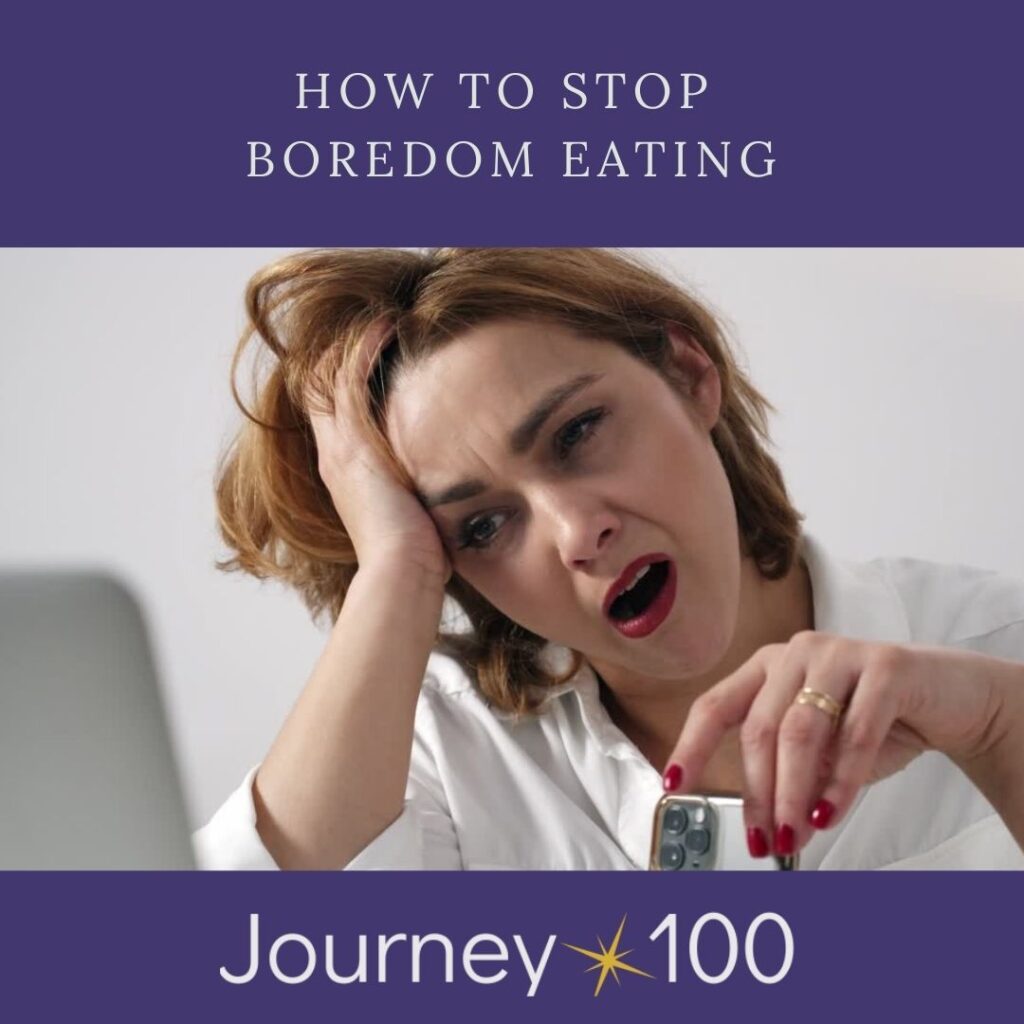
Boredom eating is a struggle for many of us. If you’re a human, chances are you think eating is a lot of fun. Especially in America, eating food is one of the most common activities we engage in while having fun. Think about it. Birthdays equal cake and ice cream. Date nights are dinner and a movie (with popcorn and candy!). Even television shows are dedicated to watching people prepare and eat food. Hello, Food Network! But boredom eating can result in unwanted weight gain because our brains get bored way more frequently than our bodies need food. Here is how to stop boredom eating: Check in with your body If you are bored and want to eat, the first thing you should do is take a few minutes to check in with your body. Then ask yourself “Am I really hungry?” If your answer is yes, then ask yourself “How do I know for sure?” Many of us have spent years ignoring our body’s cues for hunger and fullness so that second question is really important. Asking yourself how you know prompts your brain go deeper and look for your body’s signals. For those of you who can’t tell if you are hungry or not, check out this blog post on How to get back in tune with your hunger. If you can’t find evidence that you are truly hungry, then find something else to do. There is nothing wrong with eating for entertainment as long as you are hungry. Food is a solution for hunger. Food can also be entertaining. As long as both problems need to be solved there is no issue with eating for food for entertainment. Track your day and your eating habits Taking the time to jot down when you are eating each day will reveal your eating habits. Maybe every day at 3pm you find yourself snacking because the workday is almost done, energy and motivation are lacking so you eat for a distraction and a little pick me up. Perhaps after another long day of taking care of the kids, you finally get them to bed and need something to do so you head to the pantry. Whatever it is, track it. So often we go through our days on autopilot that we miss the little bites and snacks we have throughout the day. Committing to tracking each thing you eat and when, will allow you to gain insight into these habits and plan for something different. As the old saying goes “If you fail to plan, you plan to fail.” Without knowing what you normally do and making a plan for something different, you’ll continue to do the same thing you’ve always done. Learn something new If you’re bored, you probably need a hobby. Seriously! If the most entertaining thing you can think of is eating a snack, then it’s probably time to try something new. The world is full of amazing things. The next time you are bored, write a list of 20 things you would like to learn about or try. Then the next 20 times you get bored, you have a list of 20 solutions for your boredom. Don’t worry, these don’t have to be long and involved things. They could be as simple as googling your favorite singer and seeing how their career started. You could fill in a few lines of a crossword or sudoku puzzle. Try a new makeup technique. Find a drawing tutorial on YouTube. Organize a drawer in your home. Write a letter to someone you love (maybe yourself!). The possibilities are endless. Remember to keep the list handy. May I suggest putting on the fridge or the pantry? Get a change of scenery One of my favorite ways to bust through boredom without eating is going outdoors. During the COVID pandemic, I noticed that I was eating quite often simply because I was bored of looking at the same people and the four walls of my house all. the. time. I think we can ALL relate to that. Going outside allowed me to give my brain new things to process through all of my senses. The sun on my skin, the chirping of birds, new smells of grass and dirt, and the sight of beautiful blue skies. Just walking around my neighborhood was enough to distract me from my desire to eat. It wasn’t about going for a long walk. It was simply about changing the scenery and giving myself something else to think about and experience for a moment. Which of these techniques will you try? Comment down below. Your Coach, Andrea
Seven signs that you are an emotional eater
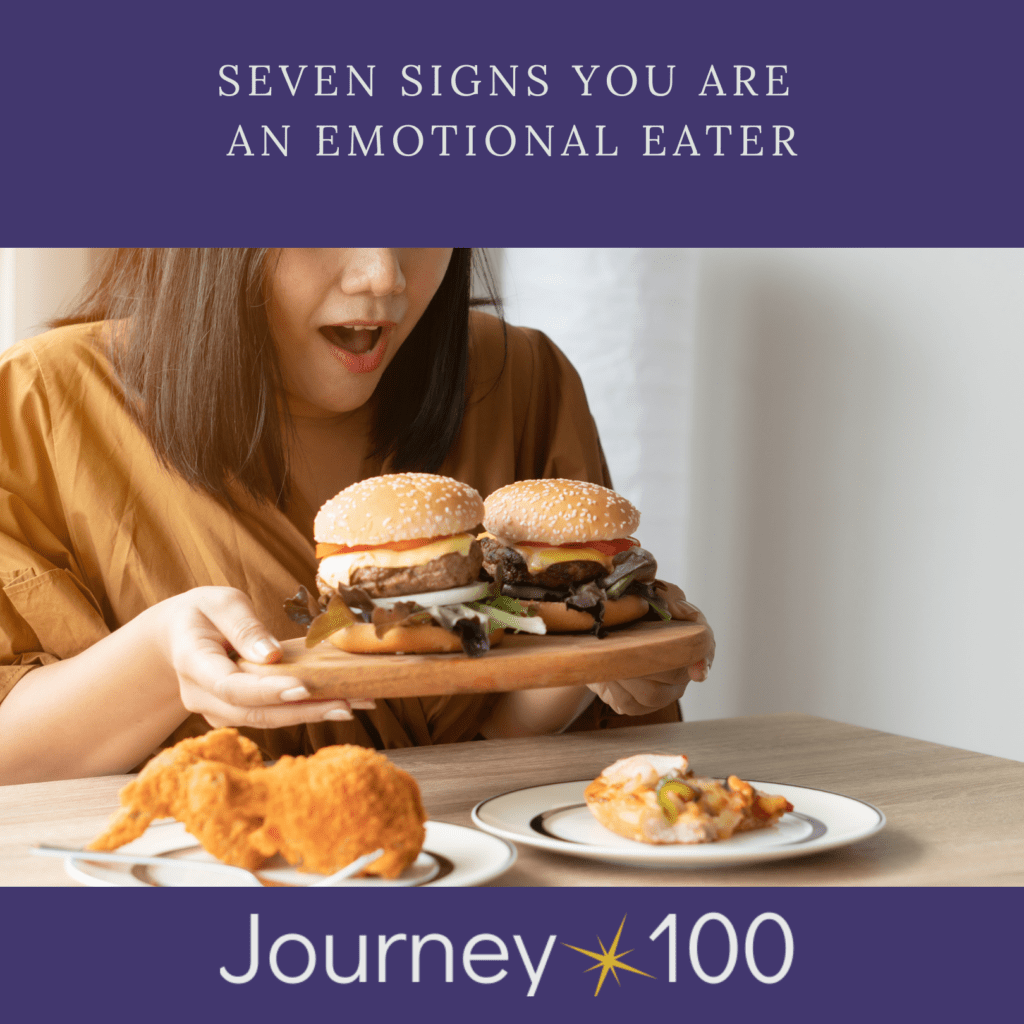
Emotional eating is the enemy of weight loss. It is very easy to identify emotional eating when it presents itself exactly how we see it in the movies: woman gets dumped and she sobs into a pint of Ben and Jerry’s. But that’s not the only way emotional eating presents itself. Here are seven signs that you are an emotional eater: 1. Hunger and urges come on strong and quickly The act of digestion in the human body is a gradual process. You consume food and (depending on how much you ate) over the next few hours the body goes to work digesting. Hunger starts gradually as the stomach is mostly empty and gets more intense as it remains empty. True biological hunger can even come and go as the call for food remains unanswered. Emotional hunger is just the opposite. It is strong and intense. You may feel powerless against the call for the chocolate chip cookies after dinner or the bag of chips mid-afternoon. Sudden and intense urges for certain foods are a sure sign of emotional eating. 2. You struggle with snacking at certain times of the day If you have certain times of the day when you are drawn to eat, this is emotional eating. Most often my clients report the 3-5pm or after dinner timeframe to be the most problematic for unwanted or emotional eating. This is prime time for the stress of your day to have built up and leave you searching for some relief in the form of food. Even if you are eating because it is a certain time of day, this is emotional eating. Eating because it is 9am and “breakfast” time is emotional eating if at that time you aren’t experiencing true hunger. Which bring us to the next sign: 3. You eat when you aren’t hungry If you aren’t hungry and you choose to eat, you are emotionally eating. Has anyone ever asked if you were ready to eat dinner and you answered “I could eat?” Chances are you weren’t hungry but could fit some extra food into your stomach so yeah “I could eat.” Eating at times when our body isn’t physically asking us for food means that we are eating to our emotions. It could be boredom, stress, connectedness, relief, entertainment, happiness, etc. Connectedness is a BIG one. Many of us choose to eat so we feel connected to those around us. We don’t want to sit at a meal, party, gathering and be the only person not eating. That’s emotional eating. 4. You get excited about eating every time you eat Food can be an exciting and pleasurable part of our lives. However, if you are routinely excited and can’t wait to eat, you are eating emotionally. Many of my clients are high achieving women who lean more into business than play. They are constantly working hard and achieving big goals that food becomes one of the only constant joys in their life. They use food as a reward because it is widely socially acceptable and necessary to live. It’s an activity that they must do anyway while every other minute of their day is spent working and serving those around them. Even if you are not a high achieving woman, take note of what felt good to you throughout your day. If you can’t think of anything other than that delicious slice of cheesecake you had after dinner, chances are you are emotionally eating in the very same way. 5. You use eating to delay doing other things There is no doubt that your to-do list is as long as the day is long. Works tasks, household chores, scheduling meetings/appointments, car maintenance, calling the utility company…the list could literally go on forever. Especially when COVID-19 hit the U.S., I found myself curiously wandering into the kitchen to find a snack throughout my work day. At first, I was frustrated until I began to see a pattern. Every time I received an email from my boss giving me another assignment or I was about to start a project that I was dreading or unsure of how to complete, the urge to check the fridge came over me. The amazing thing is that as I became aware of my action and the reason behind it, I was able to make lasting changes to that behavior. Now when I get that urge to hit the kitchen during the workday, I ask myself some important questions: What am I really hungry for? If I wasn’t going to grab a snack, what would I be doing? What can I do to mentally prepare for my next task? 6. You feel out of control around food Once you start, you just can’t stop. If that is your mantra around certain foods, this is your wake up call that you are emotionally eating. Feeling compelled to eat something or to eat something until it’s completely gone is driven by your emotions. Feeling compelled or driven are emotions. Often times you are eating past the point of giving your body the amount of food that it needs and therefore the desire and urge to eat is not driven by your physical need but rather your emotional needs. 7. You have trouble losing weight For many of us, tracking calories and following a certain diet works until we quit following them. We are able to play by the rules until the rules become too much of a burden on how we live our lives. Frustration, resentment, boredom and plain ol’ don’t wanna creep in and overtake our resolve to lose the weight. We are able to lose the weight until our emotions overtake us and we decide that we want to eat whatever we want more than losing our excess weight. That’s why addressing your emotional state is the best way to navigate weight loss. You can solve for what you are truly needing in that moment and leave the food for nourishing
